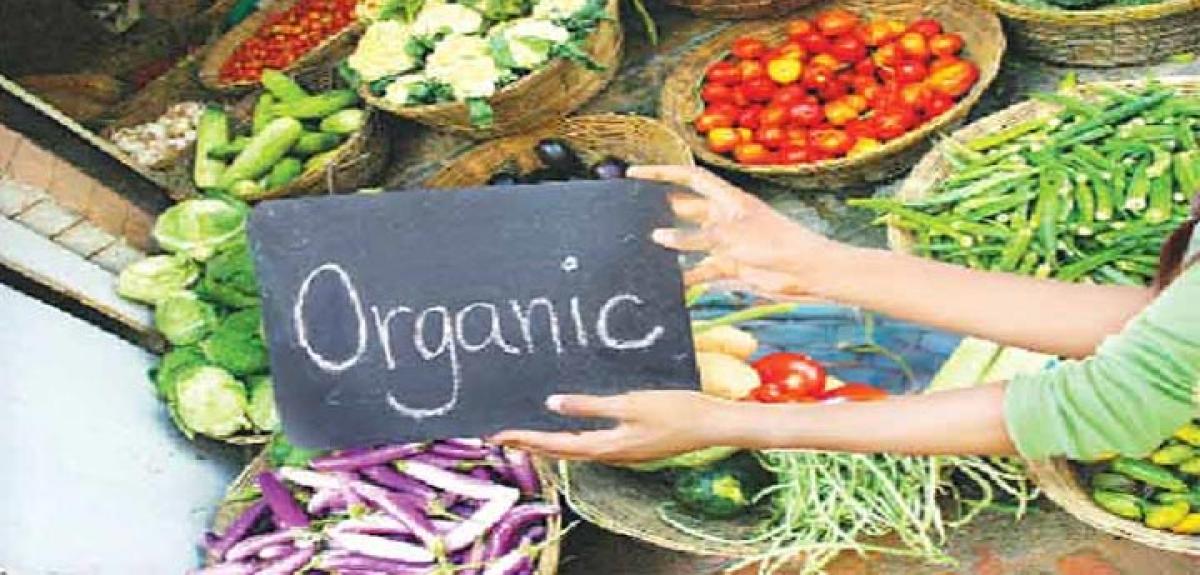Organic farming gaining popularity in Anantapur

The district is in for a major organic revolution with the department of Agriculture taking the lead and initiative to wean away farmers from excessive use of fertilisers and pesticides and the disastrous effects of chemical residues on vegetables and fruits apart from air and water pollution, that is causing cancer to the consumers.
Raptadu (Anantapur): The district is in for a major organic revolution with the department of Agriculture taking the lead and initiative to wean away farmers from excessive use of fertilisers and pesticides and the disastrous effects of chemical residues on vegetables and fruits apart from air and water pollution, that is causing cancer to the consumers.
- Excessive use of chemical fertilisers on vegetables and fruits is causing cancer to the consumers
- 4,500 farmers are cultivatingin 15,000 acres in organic zones of 10 clusters in 8 mandals
Farmers in the district are being educated on the ill-effects of chemical resides in vegetables and fruits citing Punjab example where the use of chemicals is the highest in the country and the incidence of cancer in relation to the excessive use of chemicals is also the highest, according to agriculture experts studying the issue in the district.
A section of the department officials under the leadership of district Project Manager and supervision of Agriculture Joint Director P V Srirama Murthy is working on a mission mode to woo farmers towards organic farming. Accordingly, 10 clusters combining 53 villages in 8 mandals have been formed demarcating them as organic zones where 4,500 farmers are cultivating in 15,000 acres.
The 10 clusters include Raptadu, Kideru, Vajrakarur, Kundurpi, Somandepalle, Ammadaguru, Melavay, E Gundumela and Neelakantapuram. They are raising paddy, vegetables, pulses and horticulture crops. The department of Agriculture is training agriculture officers in organic farming so that, in turn, they can motivate and guide the farmers in taking up organic cultivation.
Speaking to The Hans India at Raptadu village, Srirama Murthy stated that farmers are finding their produce more remunerative than the chemicals and fertilisers based cultivation. Although the organic cultivation does not give high yield as the chemical based cultivation certainly it is fetching a higher price than the inorganic cultivation.
Besides, the general population, who have become highly health conscious, were opting for organic food and are beginning to realise that they are sitting on a chemical bomb which has already triggered in a health disaster unheard of in the past, he added.
Adinarayana, an organic farmer of Kothapalle village in Raptadu mandal during his interaction with The Hans India at his village stated that he had been cultivating paddy and tomatoes in his 3 acre land using totally organic manure including plant extracts, cow dung, cow urine and other organic juices and kashayams. The result is production of healthy rice and organic tomatoes.
Adinarayana maintained that the organic BPT rice fetched him Rs 4,800 per quintal whereas as the inorganic paddy fetched him only Rs 3,200 per quintal. His paddy was in great demand and traders are coming to his farm directly and procuring them, he added with a sense of pride. Nearly 6 to 7 farmers also have shifted to organic farming after watching his experiment with organic process.
One farmer owning 30 acres of land have taken to 100 per cent organic farming and cultivating grapes, papaya, pomegranates and sweet oranges. Agriculture Officer (technical) Lakshmaiah observed that there were scientific reports of finding chemical residues even in breast milk of mothers, who are consuming chemical based poisonous food.
This speaks volumes of the magnitude of consumption of poisonous food by the common man. The high incidence of cancer in Punjab in relation of highest fertilisers use in that State is nothing but alarm bells. Unless, the farmers in AP wake up to the impending disaster, future for farmers and general populace is bleak, he asserted. Many NGOs in the district are advocating and successfully influencing farmers to switch on to organic farming.














